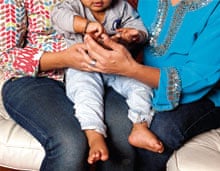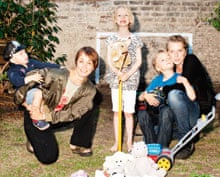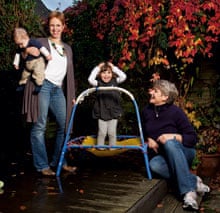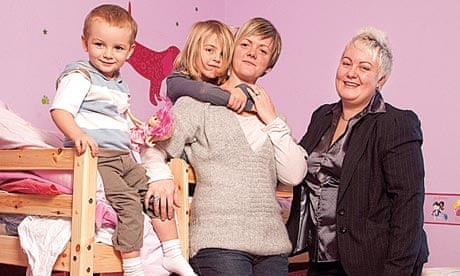Do lesbian mums make the best parents? According to research released earlier this year, children raised by two mothers do better academically, have higher self-esteem and are less likely to have behavioural problems than peers who have been brought up in a family with two heterosexual parents.
The 25-year study, published by the American journal Pediatrics, followed 78 couples who conceived using donor sperm. The mothers were interviewed during pregnancy and the children were tested and interviewed at ages 2, 5, 10 and 17, along with their parents. The study found that children raised by lesbian mothers scored similarly to children raised by heterosexual parents on measures of development and social behaviour. However, children raised in lesbian homes scored higher than kids in straight families on psychological measures of self-esteem and confidence, and did better at school. And while 26% of American teens report physical abuse by a parent, not a single case was found among the children in their study.
What do the results mean: that lesbian women are more committed parents? Or, perhaps, that early teaching about diversity, sexuality and tolerance is the key to raising emotionally intelligent, confident kids?
We met four different families living in the UK, to talk about both the benefits and the challenges of raising children with two mums. In each case, it was noticeable that both mothers were equally involved in all aspects of their children's lives; and that they consider open communication with their children to be crucial. They shared with us their style of parenting, how they explain the difference of their situation to their children – and whether attitudes towards gay families have really changed.
ASHLING PHILLIPS AND NATALIE DREW
Ashling, 32, and Natalie, 35, have been together for nine years and live in Birmingham. They have two children, Giana, five, and Kai, two
NATALIE: My family didn't take my coming out very well. They were so homophobic that I moved out at 17. It was only after Ashling and I got together that there was some level of acceptance. Having our children has brought the whole family closer together. They've accepted us and realise that times have changed.
ASHLING: Natalie and I had been friends for 17 years. We both went off to university, and when I moved back to Birmingham nine years ago, we got together.
NATALIE: I'd always wanted kids and a few of my gay male friends had offered to donate sperm. We thought it would cause complications, so we researched agencies online and found they were charging huge amounts. We didn't trust the process. How do you know it's what you ordered?
ASHLING: We decided to find a private donor and do it ourselves. We found Ben on a sperm-donor website and arranged to meet. We got along well, and after we'd all had a health check, he fathered our two kids. He's in their lives and sees them two or three times a year. They know him as Daddy Ben, and we've tried to keep everything as open and honest as possible.
NATALIE: You'd be surprised how many men want to help women in our situation. After our experience, we decided to set up gayfamilyweb.co.uk, offering to connect gay families with donors and other gay families. It was difficult for us to meet other gay women with children in our area – although we had the support of our straight friends, we felt isolated as we had no one to talk to in the same situation.
ASHLING: It's been difficult at times because I think people in our town weren't exposed to gay families before. Overall we've been accepted by our community, but every now and then there's a little reminder that people don't know how to deal with gay families. The week before Father's Day this year, Giana's class made cards, and because her school wasn't sure what to do with her, they got her to make a card for her little brother instead. She's young and didn't understand why she was asked to make a card for her brother while all the other children made cards for their dads. The school knows that Natalie and I are together – they just didn't know how to deal with the dad issue.
NATALIE: The children are still a bit too young to really be aware that our family isn't the traditional set-up. They know Ash and I love one another and that Daddy Ben helped us make them.
ASHLING: The one issue people tend to bring up is the concept of the absent father figure and the effect that will have on the children, especially Kai. We've made a conscious decision to ensure there are strong male role models around.
NATALIE: Ash and I are both secondary-school teachers, so we do see neglected children or those who have absent fathers. We're very aware of what we shouldn't be doing.
ASHLING: We've talked about how we're going to deal with any issues that come up as they get older, and we believe that we have to be as honest as possible with them. I think having two women in the household means the children get more attention. It's very homely, and there are two people with a motherly instinct.
DAKSHA SINGH AND SEEMA KHAN

Daksha, 39, and Seema, 45, have been together for 10 years. They had a traditional Indian civil wedding in 2006 and have a 15-month-old daughter, Lia. They live in east London
DAKSHA: I've been out to my family since I was 17. It didn't go down great at the time, as I come from a close-knit Asian Hindu community in Birmingham. My parents didn't know what being a lesbian meant and were fearful of what people would say. My siblings, cousins and people of my age within the community were fabulous. Once my parents came to terms with it, everybody else just followed suit.
SEEMA: I grew up in a Muslim Asian family in Blackburn. I came out to my siblings when I was 16 and they were fine with it, but I didn't come out to my parents for a long time. My dad implied he knew when I was in my late teens, and he encouraged me to move to London to university – he was supportive in his own way.
DAKSHA: Seema and I met through work and it was quite instant for me. I hadn't dated an Asian woman before, but it felt so right.
SEEMA: We decided we were going to have our civil partnership in 2006. My mother adores Daksha, so she was pleased initially, but when she realised we were having a registration ceremony and a big Asian wedding, like a straight couple would, she was anxious about what people would say. My siblings, my parents and close family know about Daksha and me, but the wider community in Blackburn doesn't – it's easier that way.
DAKSHA: I always wanted a child. We asked friends to ask their friends if they'd be a donor, and when one said yes it turned out we knew him already. It was important to us that he was Asian, as we figured Lia would have enough to contend with without having to deal with issues about her nationality, too. We inseminated at home and it took us almost a year to get pregnant. It was difficult and stressful, but we got there in the end. We see Lia's biological father every couple of months.
SEEMA: Her biological father is very much what we wanted. When Lia asks who her dad is and we tell her, she will already have a relationship with him. As far as I'm concerned she is our daughter, and although the law allowing me to appear on the birth certificate changed after Lia was born, I have legal parental responsibility with Daksha.
DAKSHA: We've talked about homophobia and bullying, and we've come to the conclusion that kids get bullied for all sorts of reasons – it's not a massive concern. We're part of a tight-knit group of friends and neighbours and we have family close by, so we are lucky.
SEEMA: It's complex, we're aware of that, but what families aren't complicated? We love each other, we're committed to our daughter, and we have an amazing support network. Nothing is secret, nothing is hidden, and we'll talk about everything – that will give any child confidence and a good start in life, regardless of whether their parents are gay or straight.
LARA FARNHAM AND RUTH OVERTON

Lara, 41, and Ruth, 45, have been together for 10 years. They have seven-year-old twins, Bell and Isaac, and Ross, who is three and a half, and they live in north London
LARA: We both wanted the experience of carrying a child, but as Ruth's a little older we decided she would go first. It was important for us to have known donors, as opposed to an anonymous donor. We found the right man, who we spent time building a relationship with before Ruth got pregnant. It wasn't something that we treated lightly. He wasn't able to donate to us when I wanted to get pregnant, but luckily a close friend of ours offered to help.
RUTH: We wanted the children to know who these men are. We don't call them a dad – they are a donor – although the word doesn't quite match or fit the role they play in the children's lives. We see them once every couple of months and the relationships have developed over time. The whole process was quite intense, but we're aware that these fantastic men have helped us out in the most enormous way.
LARA: A tremendous amount of trust, love and respect has built up between us and the donors. Aside from the fact they helped create them, it's great for the children to have male input, along with their grandfathers, uncles and friends. It's important to have that male energy around them so that there's a balance.
RUTH: My firm belief is that a child's well-being is down to the quality of parenting. Academic results are a little bit about a child's ability and 95% about support from parents to achieve. Lesbian couples have to work so hard to have their families – I suppose for that reason there's a possibility that you make more of an effort. What children need most is unconditional support and love. I don't think it has anything to do with having two mothers.
LARA: We are doing everything we can to equip our children with the right language and attitude to deal with peer pressure – and the main thing is for them to feel like they can talk to us. Whatever we do, our kids are at the centre of it.
RUTH: You'll always come across people who are prejudiced. What's amazed us is that we're going through it as adults, and it's easy to forget what it's like for a child. Just recently Lara and I have tried to look at prejudiced behaviour from a seven-year-old's point of view and teach them skills to deal with what may come.
LARA: The desire to be as involved as possible in our children's lives is part of the reason Ruth is a governor at the school. We want to be right in there and know what's happening. Having a close-knit community has been pivotal for us – both at the school, in our local neighbourhood, and with our friends and family.
RUTH: There's this idea that because we stand out from the norm, we have to be better than it – like super-parents – and there is a pressure to justify the fact that we're lesbian parents, but we're doing the best we can. It's a constant learning process for us.
LAURA MARAKOWITS AND NATALIE BUSCHMAN

Laura, 43, and Natalie, 35, have been together for seven years and were married in Belgium in 2006. They have two children, Sanne, three, and Quinten, seven months, and live in south London
NATALIE: We met while on holiday in South Africa. I'm from Belgium but had been living in London for some time, and Laura is American. We were introduced by mutual friends and neither of us saw it coming, not least because until I met Laura I had only been in heterosexual relationships. It was quite the whirlwind romance.
LAURA: It was a reach for both our families initially. Natalie had never dated a woman before, much less announced she was going to marry one. She's from a small village in Belgium and gay marriage is recognised over there [as opposed to civil partnership]. I'm from a conservative town in Virginia, so when we told my family we were getting married it took a while for my dad to agree to come – he was expecting protesters waving banners, which wasn't the case at all. I guess there was a natural element of fear there for us, but they're totally fine with it now, especially since the children arrived – how could you not love your grandchildren?
NATALIE: I definitely wanted children all along. The relationship wasn't going any further if Laura didn't want them – it was a deal breaker for us.
LAURA: For me it wasn't a must, but I was open to the idea if I met the right partner, because I knew I was never going to be the one that had the children. It felt like a natural progression in our relationship and I thought Natalie would be an amazing mother.
NATALIE: We planned and researched our options thoroughly beforehand, and of course we had to decide what method we wanted to take. It was about finding the process that we felt most comfortable with. We'd initially considered a friend based in the US, who was happy to help us, but we felt it could over-complicate matters. We decided to go for an anonymous donor instead.
LAURA: It's enough work trying to get two parents to agree on how to raise a child without adding a third parent to the mix. That's why the anonymous-donor option was the best for us. The donor is only anonymous until the children turn 18. As far as we're aware, they only get a name and a last known address, upon request.
NATALIE: We got pregnant via artificial insemination – with Sanne it happened straightaway, but it was harder with Quinten. After three attempts we were both stressed – and it's expensive – so we had to sit down and decide where to go from there. IVF was at the bottom of our list of options because of the cost and the drugs involved, but we didn't have any other option. It turns out there was a scheme whereby if I donated eggs myself, I would get a cycle of IVF in return, which luckily worked for us on the first go.
LAURA: I think we plan a lot more than a straight couple would. Natalie and I were discussing how we'd pay for the children's education before she got pregnant. It's all to do with having to make such an effort to try and have children – you're constantly reminding yourself what you went through to have them and that it was a more conscious decision than if you were to accidentally fall pregnant.
NATALIE: For us, our focus is to be honest about our sexuality and open to any questions we're asked by our children as they get older. We probably emphasise how special they are and how special our family is a lot more than straight families. Sanne is only three and a half, but she's already being asked questions at nursery about where her daddy is and why she's drawing two mums – we just make sure she feels secure enough in our family to answer.
LAURA: Of course we're concerned that our children will be bullied, but being a child – regardless of the parents' sexuality– is stressful. The average 10-year-old gets harassed by their peers about everything. I'd like to think that they won't be teased just because their parents are gay.
NATALIE: We've heard of lesbian mums who have told their child that if they feel uncomfortable telling the truth, they can lie and say that their other mummy is just a friend or an aunt, but Laura and I hope that Sanne and Quinten won't feel like they have to do that.
LAURA: We've had a wholly positive experience so far – people's attitudes have moved on so much in such a short space of time. We can make our own choices and not feel marginalised. It feels as though the wider society realises we're just a normal, boring family – we don't spent our days swinging from chandeliers.
Shahesta Shaitly is editorial assistant of the Observer Magazine
